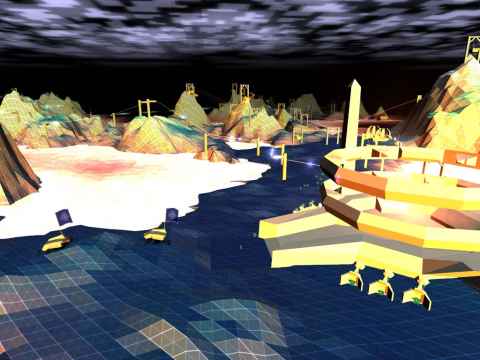Darwinia
"A digital dreamscape." That's how Introversion Software[a] describes their RTS game Darwinia[b]. A golden nugget of a game that will probably never even sell enough to cover its development costs - sadly.
The story behind Darwinia is simple: A genius scientist, Dr. Sepulveda, has created a virtual world inhabited by little green people that resemble sprites called Darwinians. A virus infection has taken over the world, and only you can save it.
Darwinia plays a lot like the old Bullfrog classic Syndicate[c][1], with you often guiding a squad across the map, blasting away at the viruses with your laser guns. As the game progresses an element of RTS starts to come in, as the little green Darwinians take up arms and start to fight for their homeland.
Eye Candy
The graphic style of Darwinia is unique - anyone who lived through the 8-bit era of personal computing will recognize a mixture of the movie Tron and old early nineties and eighties games such as Syndicate[e] and Centipede[f], all wrapped up in the capabilities of today's advanced graphic processors. Here are two screenshots:
The left screenshot shows souls raining down over an island in Darwinia, and the right one shows a factory for armored personnel carriers called (appropriately) "armour".
Ear Candy
The music deserves a mention as well. Trash80[g] (a.k.a Tresk) has composed a wonderful soundtrack that sounds retro while still having all the quality that electronic music of 2005 can be expected to have. You can download all music from the game - the tracks are:
-
"pain fade down" by Trash80 (credits)
-
"schroeder's failure" by Tresk (intro)
-
"faces of a fashion" by Tresk (cutscene)
-
"excuses" by Tresk (in-game music)
Last of the Bedroom Programmers
Darwinia will remind you why you love gaming so much.
I'd like to add something to the quote. For me gaming has never been much about actually playing the games - it has been about game programming. Trying to figure out the underlying game model, how the game code is structured, and so on. Darwinia reminds me why I love to code.
In a world of million-dollar budgets and five-year development cycles that only end in yet-another-FPS-but-with-better-graphics, Introversion has managed to produce a commercial grade, genre-blending work of art. That in itself is a more gripping story than the one any game tells.
There is a place for odd games. There is a place for development houses without million dollar budgets. I tend to forget that. When I stopped programming for a hobby as my professional life took over and I didn't have time to moonlight I basically concluded that the game development scene had moved on and that I had been left behind. "It is an industry now," I told myself, "you need a fifty-person team at the very least, five years, money and even then you're more likely to flop than not." Truth is, and Darwinia reminded me of this, that the game development scene has moved on and that I had been left behind - but, anyone with the ambition and desire to do so, can catch up again.
According to Chris DeLay, lead developer, Darwinia was supposed to have been finished in three months. As it were, it took three years, and he describes it as the most difficult thing he has ever done. I understand that perfectly well.
Update 2010-06-14
The current "casual gaming" scene wasn't very big when I wrote this entry back in 2005. In particular, the Flash gaming scene was in its infancy and Flash was still fighting it out with Director, Shockwave and Java applets. Since I haven't done any serious Flash development I can't testify to the relative strengths and weaknesses of the Flash platform, but it seems to me that casual gaming is the place to go to to see new game concepts and refreshing art direction. A warning though - just as in any part of the entertainment industry, be ready to wade through a million faceless clones.
At the start of this entry I predicted that Darwinia would "never even sell enough to cover its development costs". While I was right initially, Introversion managed to rescue themselves from bankruptcy via Steam[i]:
Darwinia was eventually released in March 2005, but despite a strong opening weekend and a superb critical reception sales soon slipped too low to sustain the company (a fact now put down partly to the "optimistic" AAA price point). Within six months the developers were back on UK government benefits until November, when they contacted Valve Corporation "on a whim" to try and set up a digital distribution deal on their Steam platform. Valve responded enthusiastically and following a 14 December 2005 online launch digital sales (which exposed the game to a new, global audience) kept the company going through to the release of their third game, DEFCON.
On 15 September 2006, the day DEFCON pre-orders were made available, Introversion spent their last £1500. Fortuitously the game "did much much better than [they] ever imagined" and funds for at least the forthcoming twelve months quickly rolled in to replace it. Now financially secure, the company place their eventual success largely at Valve's feet: "Steam has made Introversion a commercial success", Tom Arundel is quoted.
Update 2010-11-11
Mark Morris of Introversion shares a harrowing and educational tale on the company blog. Although the financial woes were held at bay, ultimately a company is made of people and it was that which nearly killed Introversion, not just as a business, but as a team. I have some quotes below, but I really recommend you read the whole post, Coming Clean[k].
This came about because Introversion nearly closed it's doors in March. Now I've probably just lost half my audience, because any one who knows anything about the history of Introversion know that in the past we have complained about running out of money pretty regularly, and the thought of another tale of financial woe leaves them cold. This time though it was very different. It wasn't just the cash reserves that were depleted it was our will to continue.
...
Internally we knew within about an hour of Darwinia+'s launch that it hadn't done well enough. It took us about two weeks to really accept that and the awful realisation that we didn't have enough to continue with the office or the staff. We had a bunch of creditors knocking at the door, but worse than all of that we were absolutely shattered.


